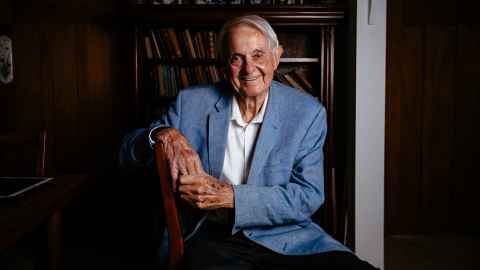Tribute to Sir Bob Elliott
27 August 2020
Sir Bob Elliott was an outstanding paediatrician, researcher and advocate for children. His passing, following a period of ill-health, is a sad loss, but we remember his major contributions to child health.

Obituary: Sir Robert (Bob) Bartlett Elliott KNZM (3 January 1934 – 21 August 2020)
Sir Bob Elliott was born in Adelaide, South Australia, educated at Adelaide High School, and studied medicine at the University of Adelaide from 1951 to 1956. After working as a house surgeon in Blenheim, New Zealand, he trained in paediatric medicine in Adelaide and Denver, Colorado. He was appointed as a senior lecturer at Adelaide in 1963, and in 1970 he moved to the new University of Auckland School of Medicine as the foundation Professor of Paediatrics.
In establishing the Department of Paediatrics, he made many notable cultural changes to improve the care and outcomes of children, which have a lasting legacy. He was critical of paediatric care in Auckland and did much to improve it, from the bricks and mortar to the workforce, especially encouraging and training future paediatricians. He was an inspirational teacher.
He wanted to see at least 50 percent of women among the paediatricians, as he knew how much women would contribute. This flew against the views held at the time by the medical establishment against increasing the proportion of women in medicine in general, and the paediatric establishment led by graduates from Otago who were mainly men.
He created a paediatric academic and clinical environment where women were encouraged. It is no accident that three of his women protégées rose to the level of professor in Auckland: the late Diana Lennon, Jane Harding and Innes Asher.
Sir Bob was always a fearless champion of children – individually and collectively. He was their voice, often in the media, advocating for their health needs, or their needs for better living conditions, being courageous on their behalf.
From early on, he recognised how poorly children were treated in hospital facilities, labelling the Auckland ward where children were treated for gastroenteritis a “dungeon”. He was right, of course, and the ward was quickly closed by the Hospital Board. Sir Bob remembered the Board wanting to remove him, but his employment by the University of Auckland protected him.
Sir Bob had a lovely personality, being warm, insightful and informal. He was delighted by and delighted children, and had an infectious chuckle. He also had the ability to be authoritative when it mattered. His high intelligence, compassion and inventiveness led to some visionary ideas although, like all top researchers, not all his innovative ideas bore fruit.
An early one that did, was extending the heel prick test given to all newborn babies to identify cystic fibrosis at birth (Crossley 1979). This test has been adopted internationally, contributing to the increased life expectancy of children with cystic fibrosis. By treating the disease early before it causes too much lung damage, life expectancy improved dramatically from 7-10 years, now to over 40.
Almost 50 years ago, Sir Bob co-founded the Child Health Research Foundation – now Cure Kids –with Dr Ron Caughey and the support of Rotary. He created the position of Chair of Child Health Research, first held by David Lines and then by Sir Bob himself for 21 years (1977-99). He had the foresight to know that unless we started investing specifically in child health research, New Zealand would drop further down the OECD health rankings. Cure Kids is now the largest funder of child health research outside the government.
Sir Bob was an outstanding researcher, and the breadth of his research was truly astounding. He did the innovative work that suggested the health benefits of A2 milk, which was commercialised. He also pioneered the transplantation of insulin-producing pig cells into humans to treat type 1 diabetes (Living Cell Technologies). He continued to be active in research even as his health deteriorated. And in his last weeks, he was on national TV advocating for cheaper access to a new treatment for a child with cystic fibrosis – a children’s champion to the end.
In the 1999 New Year Honours, Elliott was appointed a Companion of the New Zealand Order of Merit, for services to medical research. He was promoted to Knight Companion of the New Zealand Order of Merit in the 2020 Queen's Birthday Honours.
Without doubt, Sir Bob was New Zealand’s greatest child health researcher, who led a turn for the better in the culture of paediatrics in New Zealand. He will be missed by so many. His legacy will live on with Cure Kids, paediatrics in New Zealand and our children. Our condolences go to Betsy and his family.
Obituary by Professors Ed Mitchell and Innes Asher from the Department of Paediatrics, Child and Youth Health within the University of Auckland School of Medicine.
This tribute to Sir Bob was also published by Newsroom: Sir Bob Elliott, a champion for women and children